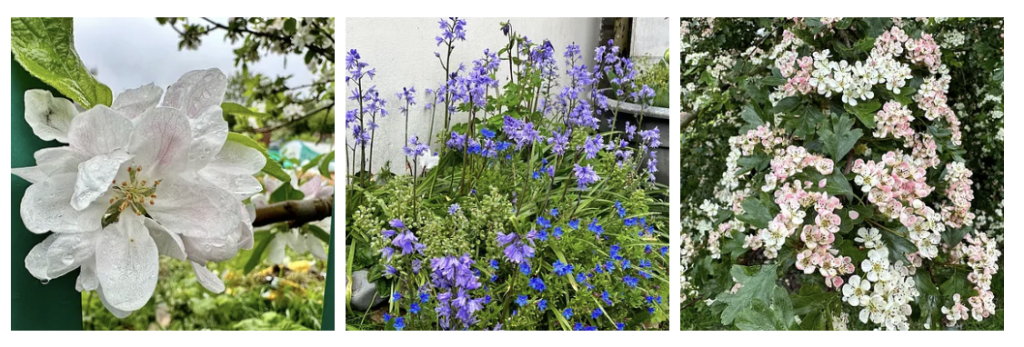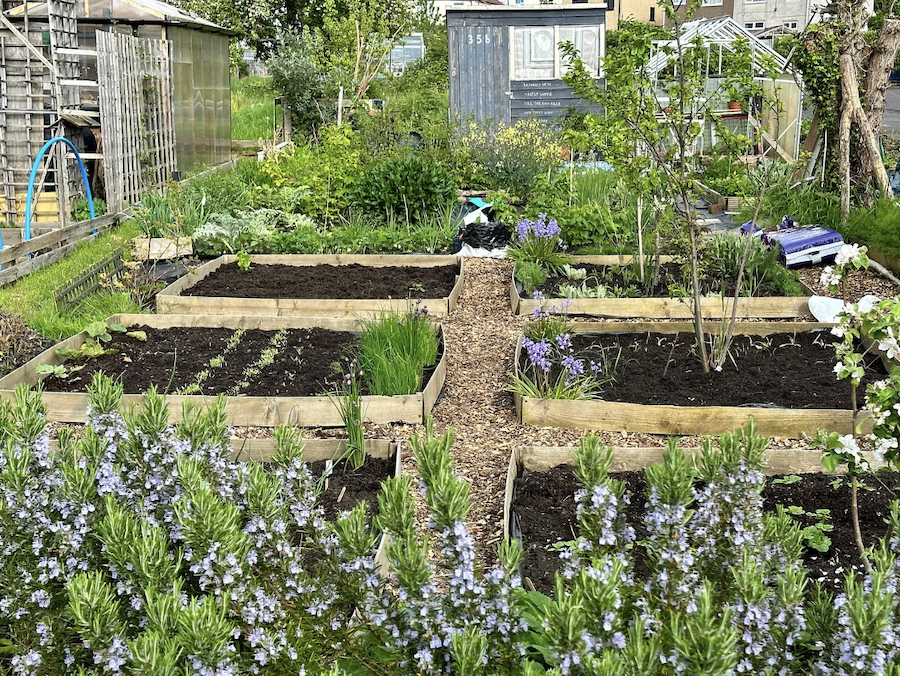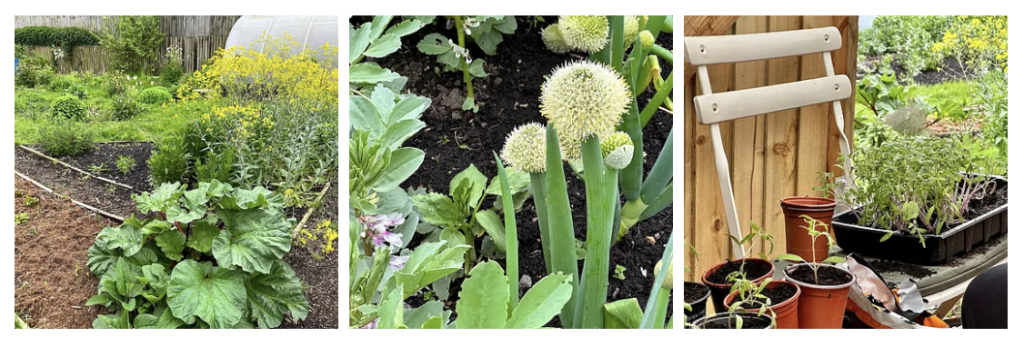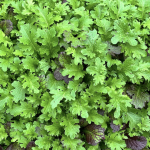On food justice
Good morning; I hope this finds you well.
This week, I was blessed with good weather, so I could sit out in the garden and enjoy the border designed in all shades of green – all to rest our eyes from the screens now and again. I spend every free moment outside simply because the birds are so loud that each second out there feels like a blessing of a bird song – I am now posting it all on TikTok, astonished to see how many people resonate with those beautiful tunes.
This year is confusing – spring and summer are here. In the park and hedges, summer flowers are already in bloom. Our front garden tulips and daffodils are only just now opening! I am patiently waiting for warmer days as the temperatures gradually improve and enjoy the improved ratio of sunny days in the week.

Last Saturday, I finally joined the Incredible Edible Bristol to volunteer my skills and to learn more about food justice and gardening for wellbeing. Boston University posted an excellent definition of the food justice movement: “The Food Justice Movement works to ensure universal access to nutritious, affordable, and culturally-appropriate food for all while advocating for the well-being and safety of those involved in the food production process.” Global Resilience Summit featured it as a topic this week, mentioning the UK-based Incredible Edible movement.
On the surface, the idea is simple: using public spaces to grow food for the general public and educating people on how to do just that: grow your own food. If you think about this more, it’s incredibly radical and essential to the future of our kind. If you want to understand the importance of this, check out Ron Finley’s course, the film with Jeff Bridges, look into your local stats on access to food…and if you want to dive deeper, explore the biopiracy or the importance of companies like the Real Seeds allowing customers to regrow their crops (did you know that F1 hybrid plants cannot be cultivated in their second generation and if we’re not careful we risk poverty of access to seeds too?).
Here in Bristol, the Edible Bristol team grows veg in many public spaces so people can help themselves to free food. I have watched the work of Sara and the team since day one of living here, in fact, since the summer before we moved here. I bumped into the gorgeous greens in the concrete-covered, hyper-modern Millenium Square and loved the idea of rosemary, mint, apples and insect hotels in such a central city space.
It took me a few years to make time for this volunteering, and I feel that maybe I also had to learn some growing basics on our own allotment first. We took it on fully covered with grass, weeds and brambles, and only this week am I taking off the last patch of grass and weeds to finish the groundwork. It’s been three years…one step at a time. The allotment was and continues to be my quiet space to restore, reflect on my work – which I cannot share with anyone due to client confidentiality – and enjoy the sublime solitude of nature (not to mention the workouts and homegrown edibles too!)

My growing skills are limited, so I hope to learn from the best. Now that we have finally conquered the clayish soil and can grow nice things, I want to learn how to make the most of what this space offers. On the other hand, I also want to understand the collective impact of growing our own food on our communities and the planet. So every second Saturday, after my allotment workout, I will be walking over to the other side of the road (Edible Bristol shed is so close to us that I can see it from my plot!!!) to help, learn, discuss, meet new people and to contribute with my digital skills too. There is something humbling in working the soil with similarly minded, kind people: we cultivate so many layers of connections. It is also, of course, incredibly holding and healing. So, I cannot wait to tell you more about this project.

Growing food aligns us with the cycles of Nature. I find that rhythm incredibly soothing and grounding. The American poet, Albert Huffstickler, wrote once:
“We forget we’re
mostly water
till the rain falls
and every atom
in our body
starts to go home.”
We have this poem on our allotment shed as a gentle reminder of that truth.
(Reflection)
Today I invite you to demystify the myth of harmful screens. We have spent so long assuming that screens are harmful that by now, many of us throw that myth into daily conversations without even fact-checking it. The Royal College of Paediatrics and Child Health have finally called it out and produced balanced, informed guidance on the topic: “The evidence base for a direct ‘toxic’ effect of screen time is contested, and the evidence of harm is often overstated. The majority of the literature that does exist looks only at television screen time.” It’s not the screens themselves that cause a detrimental impact on our eyesight or general wellbeing but extensive use of those. Screens don’t harm us if we’re sensible. Like with any other type of work or entertainment, we need to rest from it now and again. So today, I invite you to consider spending more time in Nature – not away from screens, but using screens wisely:
Q: When you go for a walk, use your smartphone to take a few photos or record a short video and then put it away – focus on grounding yourself in Nature around you. You can do the five senses exercise too. When you come home, check out the photos and videos and connect with the feeling of relaxation experienced outdoors.
Q: Use your digital tools and Internet access to explore the topics mentioned in this article and act on it: grow mint in your window, rent a small allotment or get involved in a local food growing initiative.
Q: Check out Google Maps for your local garden shops and centres and visit them. Walk around, and take in the shapes, colours, and scents. Browse around. Grab a cup of coffee. Check out new areas too. Love of learning is a core character strength in positive psychology, so cultivate it and see what you can find out about growing flowers, fruit and veg.
Q: Download the Merlin app and identify the birds singing in your area.
Q: Plant beans and watch them grow in your kitchen. Check out Pinterest for tips on regrowing vegetables from scraps you already have at home. Grow an avocado tree from stone.
Q: Go for a walk and use Google Lens to find names for the plants around you.
(I wish you fun explorations while I continue with that last bit of grass and weeds in the allotment. Have a light Sunday!)
This post was originally posted on Substack in our Syl’s Liberation Psychologies Newsletter.

